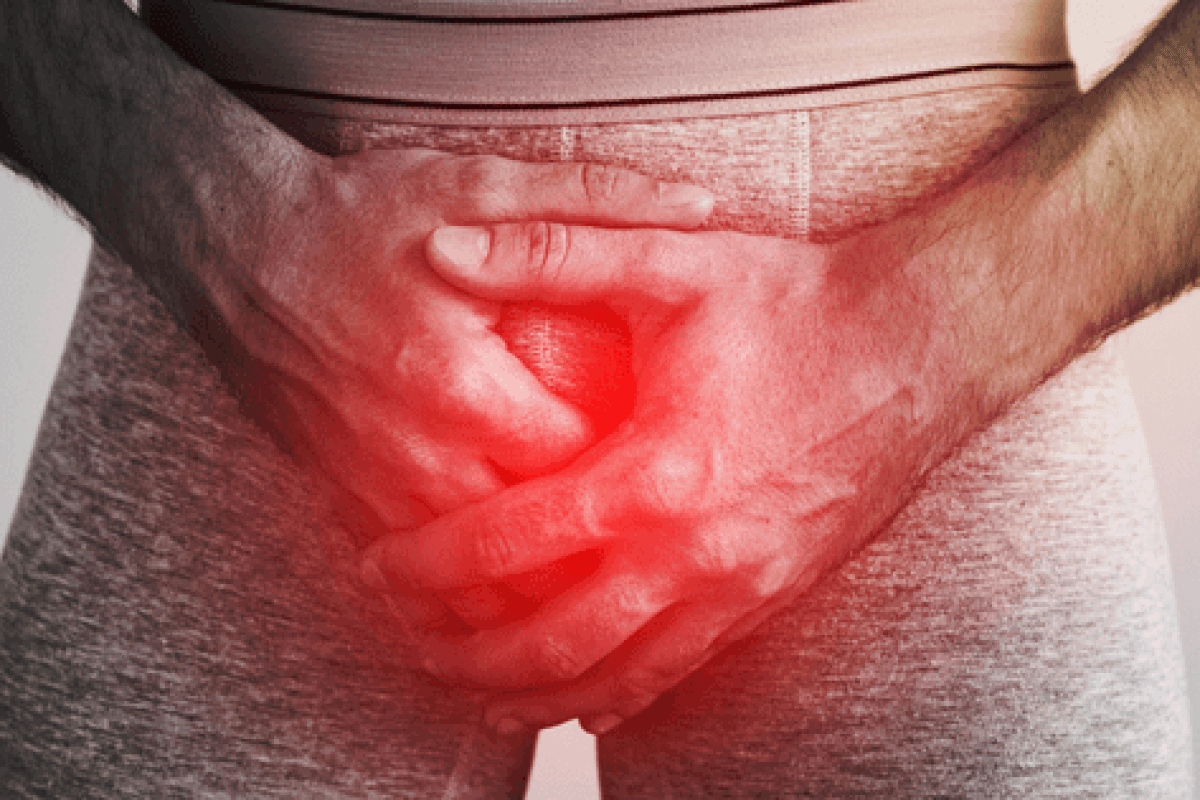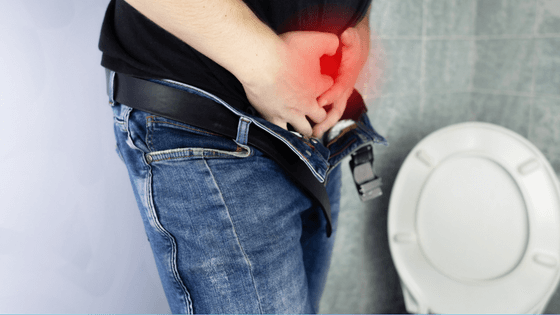The Truth About Prostate Enlargement: Causes and Treatment

Last Updated on May 12, 2024 by Lauretta Iyamu, PharmD
Are you concerned about prostate enlargement? Do you want to know what causes it and how to treat it? Prostate enlargement can be a scary diagnosis, but the good news is that there are ways to treat and even prevent it. In this blog post, we will explore the truth about prostate enlargement, including its causes and treatments. Read on to learn more about what causes prostate enlargement and how to manage it.
What Causes Prostate Enlargement?
There is no definitive answer to this question. However, several factors can contribute to prostate enlargement, including age, genetics, and lifestyle choices.
Age is a major factor in prostate enlargement. The average age at which men first experience significant prostate enlargement is around 70 years old. As men age, their prostate gland naturally becomes more prominent and active. This can increase the amount of fluid and tissue in the organ, which can cause it to enlarge.
Genetics also play a role in prostate enlargement. For example, men with a family history of prostate enlargement are more likely to experience the condition themselves. And some men are simply more prone to developing prostate enlargement than others.
Lifestyle choices can also contribute to prostate enlargement. For example, smoking cigarettes, drinking alcohol, and using steroids can all increase the risk of developing prostate enlargement. And excessive exercise can also lead to an increase in the size of the organ.
If you are experiencing any signs or symptoms of prostate enlargement, it is essential to consult with a healthcare professional. Your doctor may be able to identify the cause of your enlarged prostate and recommend the appropriate treatment.
What are the Symptoms of an Enlarged Prostate?

Many symptoms can be linked to an enlarged prostate, including;
- A feeling of fullness in the lower abdomen
- Urinary problems, such as an inability to hold urine or frequent urination
- Difficulty getting an erection
- A decrease in sexual performance
- Pain during sexual activity
An enlarged prostate can lead to more severe problems, such as heart disease and even death if left untreated. However, there are many ways to treat an enlarged prostate if identified early on. Some of the most common treatments include surgery, radiation, and drug therapy.
What are the Risk Factors for the Prostate?
When men experience an increase in prostate size, a few underlying reasons can lead to the condition. One of which is too much testosterone production from the body. This can occur due to several factors, such as
- Age (peak testosterone production typically occurs between the ages of 40 and 60)
- Obesity
- Genetics
Heavy smoking.
Men with higher testosterone levels are at greater risk for developing benign prostatic hyperplasia (BPH). Other health conditions that can cause prostate enlargement include the following,
- Diabetes
- High blood pressure
- Heart disease
- Sleep apnea
These conditions can worsen prostate enlargement. In addition, they can lead to more severe issues like bladder cancer or kidney failure if you don’t treat them.
There are many treatments available for prostate enlargement. The most common approach is hormone replacement therapy (HRT). HRT is a combination of estrogen and testosterone that helps restore body balance.
HRT effectively treats prostate enlargement and other conditions associated with increased testosterone levels.
How to Treat an Enlarged Prostate

If you are experiencing any of the following symptoms, it may be time to see your doctor:
- Difficulty urinating
- Life-threatening blood clots
- Inability to ejaculate
If you have an enlarged prostate, you can do a few things to treat it. This includes medications, surgery, hormone therapy, complementary and alternative therapies (CAM), and physical therapy.
1. Medications:
Several medications can help shrink an enlarged prostate. These include;
- Phosphodiesterase type 5 inhibitors (like sildenafil)
- Alpha-blockers (like doxazosin)
- Beta-blockers (like propranolol)
Some men find that taking these medications regularly helps reduce their symptoms.
2. Surgery:
There is also surgery available to treat an enlarged prostate.
Prostate surgery is not always necessary, but when it is, there are several types of procedures to choose from. This can include laser-sparing prostatectomies or open prostatectomies. Depending on the severity of the enlargement, either procedure may be necessary.
The most common types of prostate surgery are:
1. Transrectal ultrasound-guided interventional procedure (TRUS).
TRUS involves inserting a thin probe into the rectum through the anus and using ultrasound to guide the placement of small instruments near the prostate.
The surgeon then uses these instruments to remove cancerous tissues around the prostate without going through the general area.
2. Cryotherapy
This involves freezing and damaging tumor cells near the prostate with frigid temperatures, often resulting in death. Cryotherapy is very effective at treating localized cancers, but it does have some side effects, including temporary urinary problems and erectile dysfunction.
3. Physical Therapy:
Physical therapy can also help improve bladder control and ease pain from an enlarged prostate. Treatment options for each individual will depend on your particular situation and symptoms.
Regular exercise can help keep your prostate healthy. Exercise can help improve blood flow and circulation, which can help reduce the risk of prostate cancer. Additionally, regular exercise can help reduce the risk of other health problems, such as obesity and heart disease.
There are a few different types of exercises that can be beneficial for prostate health. Some examples include:
- Weightlifting: Weightlifting can help improve the strength and tone of your muscles, which can protect your prostate from injury.
- Swimming: Swimming is a great way to improve cardiovascular health and reduce the risk of stroke. It also helps improve blood flow to your prostate.
- Running: Running is a great way to improve your fitness level and reduce the risk of injuries. It also helps improve blood flow to your prostate.
4. Hormone replacement therapy (HRT):
While prostate enlargement can result from many factors, hormone replacement therapy (HRT) is one of the most common treatments. It’s estimated that over half of all men who undergo HRT will experience a noticeable decrease in their prostate size.
Hormone replacement therapy (HRT) is a treatment option for men with prostate enlargement. HRT is a combination of estrogen and progesterone hormones that help improve prostate enlargement symptoms and reduce the risk of developing prostate cancer.
There are a few key things to keep in mind when considering HRT as a treatment for prostate enlargement:
- HRT can help improve prostate enlargement symptoms, including reduced urinary flow, difficulty starting urination, and pain in the lower back or side.
- However, HRT can also increase the risk of developing other types of cancer, including breast cancer. Therefore, discussing the risks and benefits of HRT with your doctor before starting treatment is essential.
- HRT is not a cure for prostate enlargement, but it can help to improve symptoms and reduce the risk of developing prostate cancer.
Hormone replacement therapy (HRT) is a treatment for both men and women that helps reduce the symptoms of hormone deficiency. Estrogen replacement therapy is the most common hormone replacement therapy (HRT) for menopausal women. This treatment involves taking injections or pills that contain female hormones, such as estrogen. Unfortunately, HRT is not an option for many men due to health concerns or religious beliefs.
There are a few things to remember when considering whether to take HRT.
Firstly, discussing your options with your doctor before starting any treatment is essential.
Secondly, careful monitoring is key. You must contact your doctor immediately if you have any adverse reactions to hormone replacement therapy (HRT), such as breast tenderness or elevated blood pressure.
Finally, remember that HRT is not a cure for prostate enlargement, and you should only use it in conjunction with other treatments, such as surgery or radiation therapy.
5. Complementary and alternative therapies (CAM).
Different ways to treat an enlarged prostate don’t involve regular medicine. These are called complementary and alternative therapies (CAM). These methods can help with symptoms like hot flashes, night sweats, trouble getting an erection, and difficulty urinating.
Some examples of CAM include:
- Taking natural supplements like black cohosh or red ginseng
- Relaxation techniques
- Getting acupuncture
- Biofeedback training
- Yoga or meditation
- Movement therapy like qigong or tai chi
- Using herbal remedies like lavender oil capsules or saw palmetto extract tablets
Several CAMs have also been found to help reduce the risk of prostate cancer.
Prostate Health and Diet

Prostate enlargement is a common problem that different factors can cause. However, one of the most common causes of prostate enlargement is age. As men age, their prostate gland may become enlarged and harder to treat.
Other potential causes include lifestyle choices (such as smoking and drinking) and heredity if you have a family history of prostate enlargement, your risk increases.
The role of diet in managing prostate health is still largely unknown. But there are some key things that you can do to help improve your chances for successful treatment.
- Eat a healthy, balanced diet that includes plenty of fruits and vegetables
- Avoid processed foods, sugar, and alcohol
- Exercise regularly
- Avoid excessive stress levels
- Take regular vitamin supplements if needed
Common Misconceptions About Prostate Enlargement
There are several myths surrounding prostate enlargement and men’s reproductive health. Here, we will dispel four common ones about the cause and treatment of prostate enlargement.
Like most men, you probably don’t give your prostate much thought. However, understanding what causes an enlarged prostate and potential treatments is critical.
The truth is, there isn’t a one-size-fits-all answer when it comes to treating an enlarged prostate. Some men choose surgery; others take medication or supplements. The key is finding what works for you and your condition.
A few common misconceptions about prostate enlargement need to be addressed.
First, many men believe that prostate enlargement is a sign of manliness. But, unfortunately, this is not the case.
Second, many men believe that prostate enlargement results from sexual activity. This is also not the case.
Third, many men believe that prostate enlargement is permanent. Unfortunately, this is also not the case.
If you are experiencing prostate enlargement, you must talk to your doctor about the best treatment options. HRT may be a good solution for you.
Lifestyle Changes That May Help Prevent Prostate Enlargement

Aging and prostate enlargement are two of the most commonly reported causes of prostate problems in men. As men age, their prostate size can increase. In addition, as you age, your hormone levels change, which can lead to an enlarged prostate.
Several lifestyle changes may help prevent prostate enlargement. These include
- Eating a healthy diet
- Getting enough exercise,
- Avoiding excessive alcohol
- Tobacco use.
- Supplements that contain ingredients like zinc or omega-3 fatty acids.
Benefits of Taking Natural Supplements for the Prostate
There are many benefits to taking natural supplements for the prostate. Some of these benefits include:
- Prostate enlargement can be prevented with lifestyle changes, such as a healthy diet and regular exercise.
- Taking natural supplements can help to improve the quality of life for men with prostate enlargement.
- Natural supplements can help reduce prostate enlargement symptoms, such as difficulty urinating and feeling tired.
- Natural supplements can help improve prostate health by fighting infection and promoting healthy cell growth.
The good news is that many natural supplements are available to help lower your risk of developing prostate cancer and promote prostate growth. Some of these include;
- Mushrooms
- Cruciferous vegetables
- Probiotics
- Ginger extract
- Dong Quai root extract
- Ashwagandha
Can Stress Cause an Enlarged Prostate?
Stress can have a significant impact on our physical health in general. Here are some tips that may help reduce your stress levels and improve your urological well-being:
- Take some time for yourself every day:
Regular exercise can help to reduce stress levels. It’s also effective in improving many other aspects of your health, such as lowering blood pressure and heart disease risk.
You can stay active and feel more relaxed by taking a quick walk or doing some aerobics during your lunch break or after work.
- Establish healthy boundaries with friends and family members:
It can be hard to remain calm when dealing with people who try to force their way into financial decisions that do not concern them. But asserting yourself and communicating your boundaries softly, but remember that the other person may be experiencing more stressors, causing them to be hypersensitive.
- Get enough sleep each night:
Studies show that not getting enough sleep can make you feel more anxious and tired. It can also affect your overall health.
To help you sleep better, it’s a good idea to stop doing things that can keep you awake at night, like watching TV or using your phone right before bed. Instead, try to turn off all screens for at least 30 minutes before sleep. This will help you get the rest you need.
Conclusion
To sum up, many men get prostate enlargement as they age. It can make you feel worried and lead to other health problems. It is important to learn what causes prostate enlargement and how to treat it. These include eating healthy, exercising, taking hormone medicine, using natural supplements, and trying other therapies. Taking care of your prostate is important for your health.
In addition, it’s essential to know the facts about men’s reproductive health and aging and not believe myths about them. This can help you make good decisions about your prostate’s health. An enlarged prostate can be taken care of if you know what to do and have a plan.
References
- Benign prostate enlargement [Internet]. nhs.uk. 2017 [cited 2023 Jan 2]. Available from: https://www.nhs.uk/conditions/prostate-enlargement/
- Prostate enlargement (Benign prostatic hyperplasia) | niddk [Internet]. National Institute of Diabetes and Digestive and Kidney Diseases. [cited 2023 Jan 2]. Available from: https://www.niddk.nih.gov/health-information/urologic-diseases/prostate-problems/prostate-enlargement-benign-prostatic-hyperplasia
- Enlarged prostate [Internet]. Prostate Cancer UK. [cited 2023 Jan 2]. Available from: https://prostatecanceruk.org/prostate-information/further-help/enlarged-prostate/



